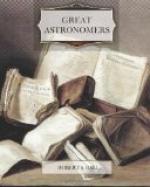Up to this time the astronomical investigations of Bradley had been more those of an amateur than of a professional astronomer, and as it did not at first seem likely that scientific work would lead to any permanent provision, it became necessary for the youthful astronomer to choose a profession. It had been all along intended that he should enter the Church, though for some reason which is not told us, he did not take orders as soon as his age would have entitled him to do so. In 1719, however, the Bishop of Hereford offered Bradley the Vicarage of Bridstow, near Ross, in Monmouthshire, and on July 25th, 1720, he having then taken priest’s orders, was duly instituted in his vicarage. In the beginning of the next year, Bradley had some addition to his income from the proceeds of a Welsh living, which, being a sinecure, he was able to hold with his appointment at Bridstow. It appears, however, that his clerical occupations were not very exacting in their demands upon his time, for he was still able to pay long and often-repeated visits to his uncle at Wandsworth, who, being himself a clergyman, seems to have received occasional assistance in his ministerial duties from his astronomical nephew.
The time, however, soon arrived when Bradley was able to make a choice between continuing to exercise his profession as a divine, or devoting himself to a scientific career. The Savilian Professorship of Astronomy in the University of Oxford became vacant by the death of Dr. John Keill. The statutes forbade that the Savilian Professor should also hold a clerical appointment, and Mr. Pound would certainly have been elected to the professorship had he consented to surrender his preferments in the Church. But Pound was unwilling to sacrifice his clerical position, and though two or three other candidates appeared in the field, yet the talents of Bradley were so conspicuous that he was duly elected, his willingness to resign the clerical profession having been first ascertained.
There can be no doubt that, with such influential friends as Bradley possessed, he would have made great advances had he adhered to his profession as a divine. Bishop Hoadly, indeed, with other marks of favour, had already made the astronomer his chaplain. The engrossing nature of Bradley’s interest in astronomy decided him, however, to sacrifice all other prospects in comparison with the opening afforded by the Savilian Professorship. It was not that Bradley found himself devoid of interest in clerical matters, but he felt that the true scope for such abilities as he possessed would be better found in the discharge of the scientific duties of the Oxford chair than in the spiritual charge of a parish. On April the 26th, 1722, Bradley read his inaugural lecture in that new position on which he was destined to confer such lustre.




